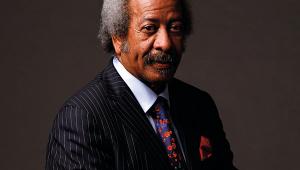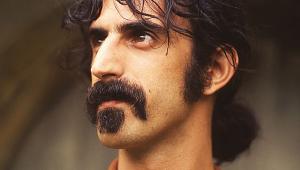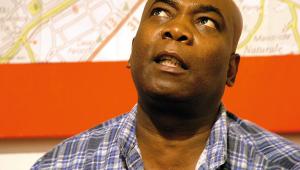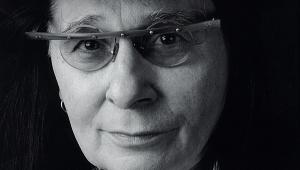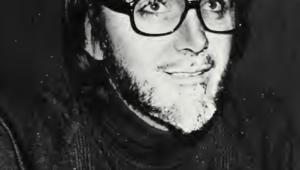Robin Guthrie Page 2
'There are types of sounds that I'll go for quite a lot, effects clusters that I particularly like. I use a lot of delays to create an illusion of space, because I don't like using reverbs with guitars. I use harmonisers to create a sort of chorus effect, often with vibrato mixed in. I use distortion on virtually every song, which isn't always obvious. A lot of it is subliminal, but when you listen to it about four or five times on headphones, you hear things that you couldn't before. It all adds to the atmosphere. 'What's important is the order in which you put your effects. Distortion, chorus, and delay are the three obvious ones. You can get some more unusual effects by putting the chorus or harmoniser after the delay, wobbling the whole thing... just flipping those two. Also, don't think that the combined sound of two effects is the same as adding what the two things would be if they were individual.'
Lack Of Confidence
He continues: 'The choice of guitar is not very important. I usually pick up one that's nice to play or has new strings on it. It's not necessarily the amplifier or the amp sound or model. Early on I had a terrible lack of confidence that I could actually play properly because when I first picked up a guitar, all my friends could play properly, and I couldn't. Just at that time the whole music scene was turning around with punk rock and things like that… Punk gave me the impetus to say, "F*** you, I can do what I want". It helped me a lot.
'Also, while you can't sit and listen to a crap jazz record – if the musicians weren't good it would sound terrible – you can listen to c***p rock records and get a lot from them because the level of musicianship doesn't really matter. There are other ways of being creative. And pretty soon I found that, by me playing my guitar through effects – at that time there were not really a lot of effects out so I was just cannibalising things and making my own things – and I just started to make this sort of noise that was really just kind of... you know… I just bypassed having to learn how to play Eagles songs. I was lucky in that I was just taking that noise and making it pretty.'

Studio Habit
Guthrie's patent sound may have influenced a whole movement in the 1990s but it continues to thrive in the most unlikely of places. Genius film-maker David Lynch, for instance, genuflects to Guthrie's talent. In fact he was desperate to use This Mortal Coil's version of the Tim Buckley classic 'Song To The Siren' in his movie Blue Velvet.
This Mortal Coil were the Cocteaus playing on a concept album conceived by Ivo Watts-Russell, their label boss, but Lynch couldn't afford the track at the time. A few years later, with bigger bucks at his disposal, he slipped it into his Lost Highway. And in the meantime, he began to carve out an alternative career to his movies, making star-dusty tracks which owe pretty much everything to the Cocteaus.

Guthrie, meanwhile, grew obsessed, spending every waking hour in the studio, and sleeping there as well. He became a 24/7 mixing-desk addict, a habit which contributed to the wreckage of his relationship with Fraser and the death of the Cocteaus. During that period he did his Guthrie thing to a phalanx of indie aspirants including The Wolfgang Press, Dif Juz, The Gun Club, old pal Edwyn Collins, A R Kane and Chapterhouse. He also fashioned tracks for Ian McCulloch and Guy Chadwick and collaborated richly with avant-garde composer, poet and pianist Harold Budd.
Here's how he explains his workload: 'Basically, when I do my own things, I just don't really give a f***. My philosophy about that is very self-centred and selfish, and not the slightest bit about the saleability; it just has to touch me. But I can't take that view when I'm producing someone else's record. I have to be in their place, and realise the record that they want to make.
'And then it's different again if I'm doing a movie soundtrack, because then I'm helping to tell someone else's story. The real freedom is when I'm just being Robin Guthrie. Something that I've probably been doing for the last 15 or 20 years is travelling a lot and making music, doing location things and just taking myself away with as little equipment as possible: a laptop and some guitar sounds, to get inspired by where I am. That's like the songwriting, inspirational part of it. I can't relate to somebody who writes a lyric, but maybe you have to be in a special place to do that. For me, I get influenced by visual things, and by what I read. I must get influenced by music somehow, but I can't tell how. I don't listen to a lot of music.
'I like to think of my instrumental music as being complete. I've had instances in the past where people who reviewed my records said, "Oh, it's really good. If only such-and-such was singing on it", and that makes me really cross, because I think it's a complete work in its own right. A lot of the music I do listen to is instrumental because I like being able to use my own imagination to create something in my head using the atmosphere and melodies. It's quite indirect.'
Paperback Writer
'With so many songs that have lyrics, there's only one way you can interpret those works. When I write music, I don't want to be limited like that. And personally, if writing was my skill, I'd rather put that skill into writing a book than a song.'
Robin Guthrie is still doing his thing, making music that sounds like, as I proclaimed all those many years ago, the voice of God. And just lately, others are coming around to my point of view. 'Remarkably prescient', Fondsound.com acquiesced recently, and even the Guardian reconsidered: 'You could see what Steve Sutherland was getting at'.
Touché mes amis...

